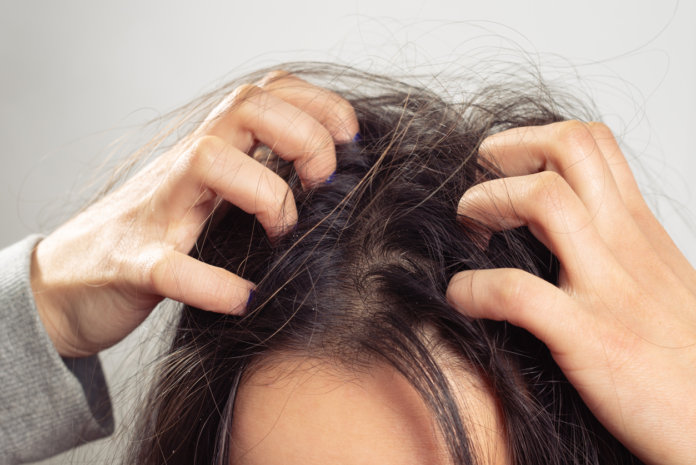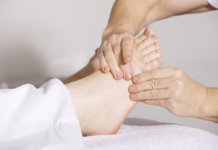There’s nothing more annoying than an itchy scalp. You know you won’t be able to focus on anything else until you scratch that itch. The good news is that having an itchy scalp every now and then is normal. But if you find yourself scratching your head all the time, then it’s time to find out what could be causing your itch. Because having an itchy scalp could be a symptom of something else. It could an autoimmune disease, seborrheic dermatitis, scalp ringworm or just plain old head lice. Here are five of the most common causes of itchy scalp — and what you can do about them.
Allergies
If your scalp is suddenly itching after dying your hair or trying a new shampoo, you may be having an allergic reaction to a chemical found in the product. Every time you use something new on your hair, you risk an allergic reaction. Especially if you have sensitive skin.
While it isn’t easy to pinpoint exactly what chemical you’re allergic to, dermatologists are noticing an increase in more people who are allergic to nickel, a substance found in cellphones, hair scissors, jewelry, hair clasps, and watch bands. If you’re allergic to metals or have a family history of allergies, you may be predisposed to developing a nickel allergy.
What to do
Generally speaking, some allergic reactions tend to go away after a few days. An allergic reaction to nickel may include rash and bumps, itching, redness, and dry patches of skin that look like a burn. Also, avoid using jewelry, hair pins, hair clasps, and scissors which often contain nickel.
But what do you do if you notice harsher symptoms like an uncontrollable itch and blisters that leak pus? You see a doctor or an allergist ASAP so you can avoid exposure to that chemical.
Head lice
Let’s get the embarrassing one out of the way first. If you can’t stop scratching your head all of a sudden, then we hate to break it to you, but you may have lice. Yup, lice isn’t something you get only when you’re in school. You can get them as an adult by sharing clothes, brushes, headphones, and towels with family members, friends or coworkers, with someone who has lice. The only way lice get transmitted is through physical touch, as they can only survive by crawling from one head to the next.
What to do
While having lice is uncomfortable, you can fight these creepy crawlers by combing your hair with a fine-toothed lice comb and using delousing shampoo and ointments that contain permethrin or pyrethrin.
Tea tree, lavender, and neem oil have also proven to be quite effective in getting rid of lice. Be sure to rub a drop of the essential oil of your choosing in the back of your arm and see if you have an allergic reaction to it. If everything’s clear, try mixing essential oil with a carrier oil such as coconut oil, olive oil, or argan oil. For example, you can mix 2 ounces of coconut oil with 20 drops of tea tree oil and leave the mixture overnight. Run a comb to get rid of all the dead lice, shampoo, and rinse out. And don’t forget to wash all your bed linens, towels, and clothes too.
Dandruff or seborrheic dermatitis
The most common explanation behind an itchy scalp is dandruff or seborrheic dermatitis, two dermatological problems that are on the spectrum of the same condition.
Dandruff is a mild form of seborrheic dermatitis and it can be the reason why your scalp feels so itchy and irritated. Other signs and symptoms may include skin flakes around the nose, ears, and eyebrows, and oily white flakes that accumulate on your shoulders and hair.
Dandruff typically occurs when the body has a severe overreaction to an overgrowth of Malassezia, a yeast-like fungus that lives on the scalp. Now, Malassezia isn’t a problem on its own, as this fungus typically lives on most people’s scalps. But some folks can have an overreaction to Malassezia. According to researchers at the University of Zurich, this pesky fungus turns into an allergen on your skin, which triggers the immune system to overreact.
Now, if you’ve self-diagnosed with dandruff but none of the anti-dandruff shampoos you’ve used have fixed the problem, then you could be suffering from seborrheic dermatitis. Yeah, we know. It sounds like an awful disease, but it’s nothing more than a severe form of dandruff.
If your scalp is suffering from inflammation, redness and irritation, you may be dealing with seborrheic dermatitis. Other symptoms include skin flakes on your nose, ears, hair, and beard, and patches of oily skin that are almost yellowish and stuck to your scalp.
What to do
If you’re dealing with mild dandruff, try over-the-counter shampoos that contain zinc and selenium. For more stubborn forms of dandruff, your dermatologist will have to examine your skin and prescribe specific antifungal shampoos, creams, or ointments to try and get rid of the inflammation. Depending on the situation, they may go for antifungal shampoos with 2% ketoconazole and if this proves inefficient, your doctor might want to put you on antifungal medication.
Sweating
Let’s get real for a second. We’ve all skipped a shower or two even after working up a sweat at the gym. But sometimes you don’t have the luxury to drop whatever you’re doing to go home and wash your hair, especially when you managed to squeeze a workout during lunch break!
But if you already ruled out lice and dandruff and you tend to wash your hair once a week, then try washing your hair more often. Letting sweat dry up on the scalp can cause the skin to get irritated and itchy because Malassezia fungus thrives on a moist environment and feeds off the oils in your hair and skin.
What to do
Wash your hair every time you exercise. If your hair is dry and brittle, then only focus on your roots and wash over the sink.
Scalp ringworm
Don’t freak out, but having an itchy scalp could be a sign of a fungal infection known as scalp ringworm (or tinea capitis).
Scalp ringworm — which causes itchy, round bald patches on your head — is a highly contagious fungal infection that can cause scarring and even permanent hair loss if it goes untreated.
What to do
The good news is that this condition is super easy to treat. But you need to see a doctor ASAP to get an accurate diagnosis. Scalp ringworm is not treatable with topical creams because the infection lodges deep inside the hair follicle, so your doctor may give you special shampoos, rinses, and oral-antifungal medicine to kill the fungi and stop the infection from spreading.




